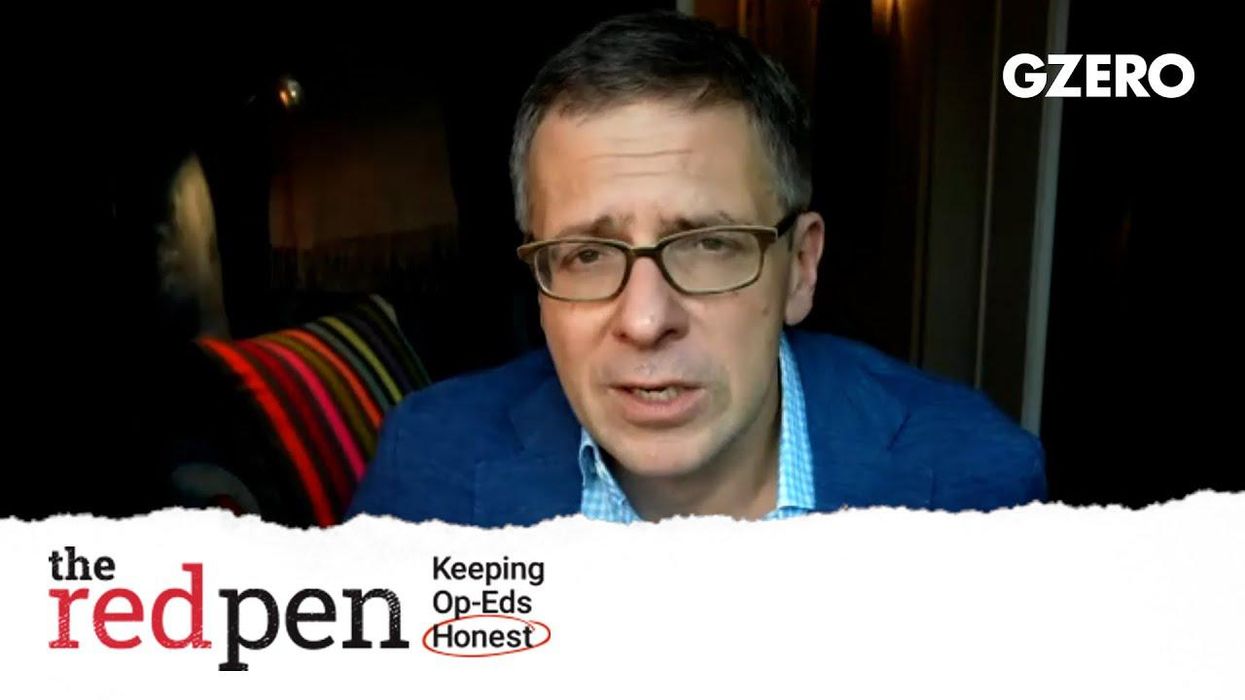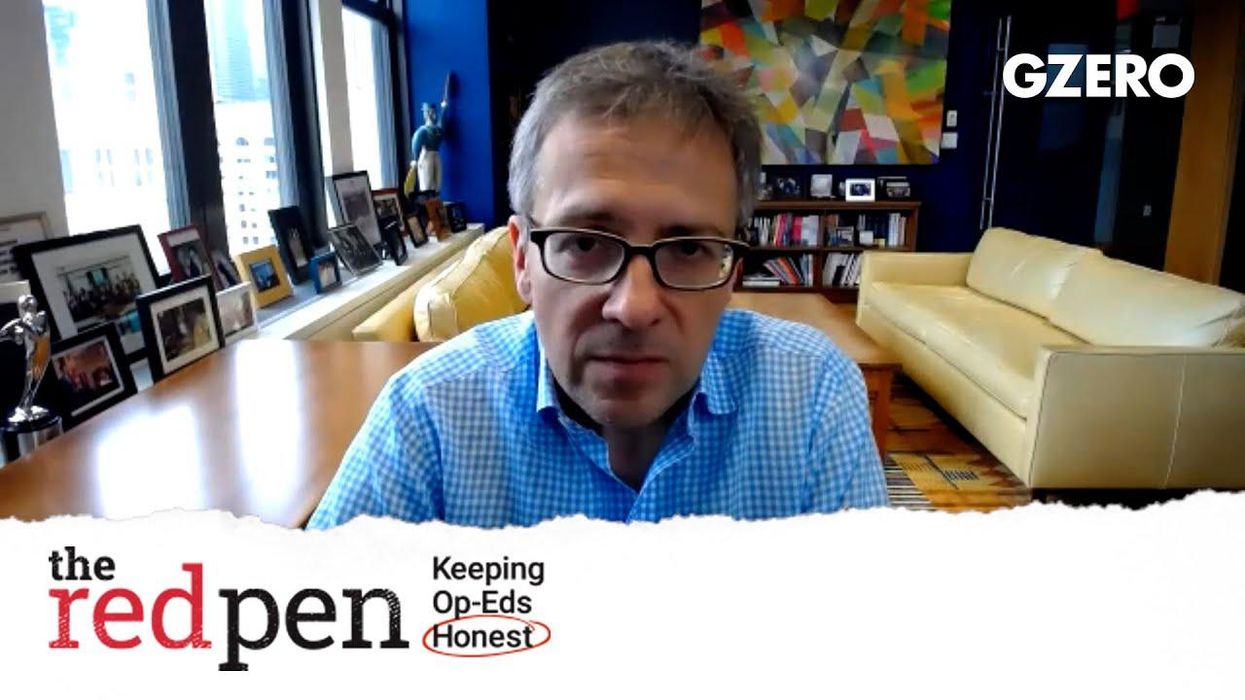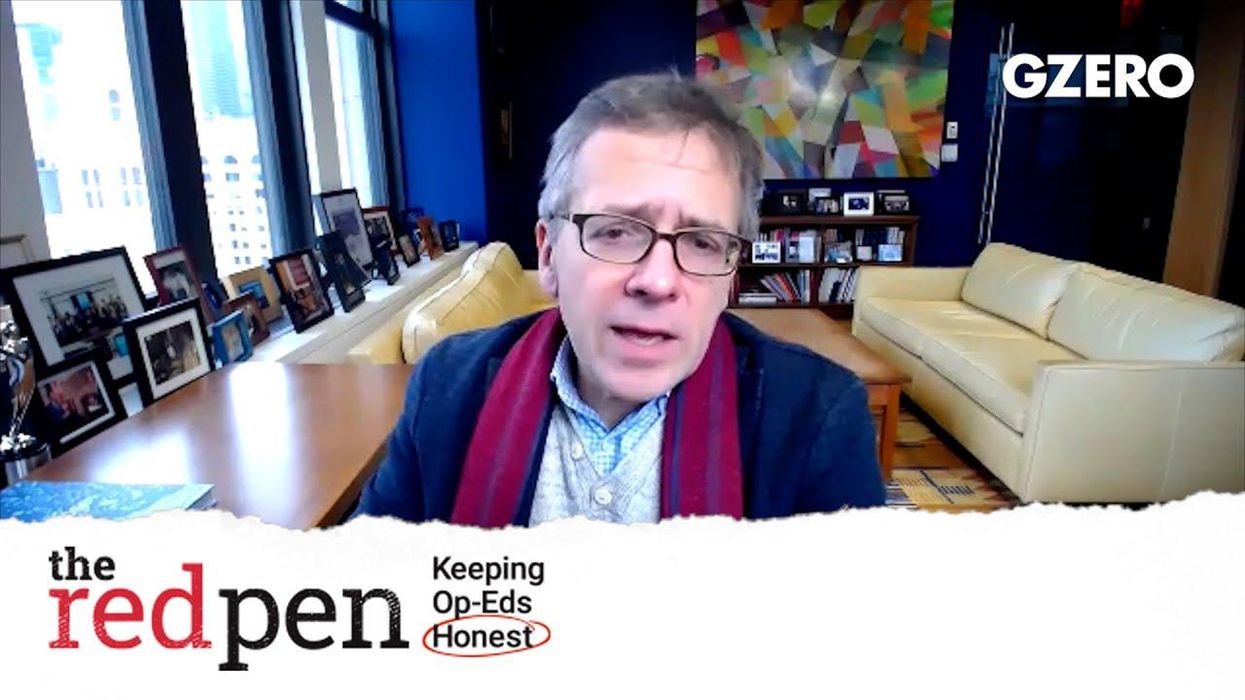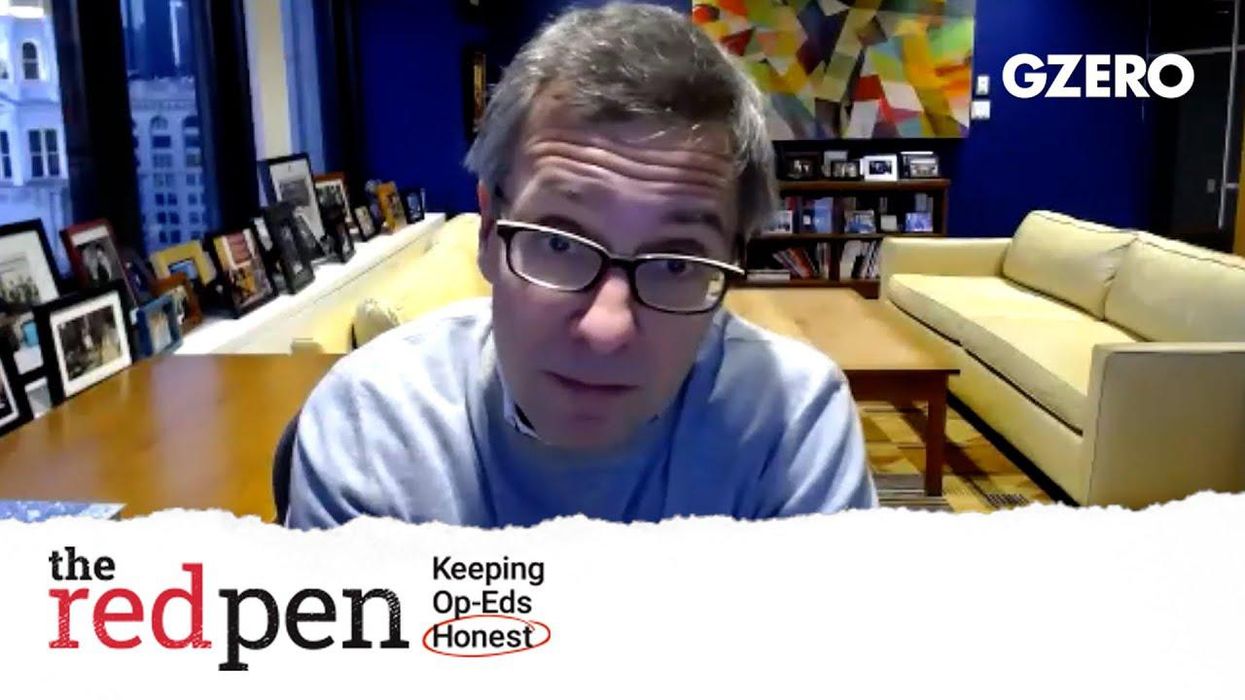VIDEOSGZERO World with Ian BremmerQuick TakePUPPET REGIMEIan ExplainsGZERO ReportsAsk IanGlobal Stage
Site Navigation
Search
Human content,
AI powered search.
Latest Stories
Start your day right!
Get latest updates and insights delivered to your inbox.
The Red Pen
On GZERO Media's series The Red Pen, Ian Bremmer and colleagues pick apart the argument in a major opinion piece.
Presented by
While the US withdrawal from Afghanistan has been deeply flawed in execution, does this really mark "the end of the American era" as foreign affairs reporter Robin Wright argues in a New Yorker op-ed? Not at all – and in fact, the US will emerge from this crisis not only with important lessons learned but in a position of power. Ian Bremmer and Eurasia Group analyst Charles Dunst explain why in this edition of The Red Pen.
Today we are taking our red pen to a recent column from New Yorker contributor and veteran foreign affairs reporter, Robin Wright, a good friend, very, very smart. It's titled "Does the Great Retreat from Afghanistan Mark the End of the American Era?" And I mean, that's quite an argument. Over the course of the past couple of weeks, I've had quite a bit to say about the story, of course, and all the horrible images that we've seen coming from Afghanistan, and even Qatar in the last 24 hours, the transit. While the withdrawal, from my perspective, was the right decision on balance, there had been huge mistakes and missteps in the execution. That much, I think that many of us agree on, but is this particular moment the end of the United States as the number one global power? No, I don't think so, and that's why we're getting out the red pen on this article. So let's get into it.
First, Robin argues that the United States will be widely perceived by the world today as having lost the war on terrorism, because Afghanistan will, again, almost certainly become a haven for like-minded militants. Well, first of all, we need to break out the US perspective on this because the threat of foreign directed Islamic terrorism against the US Homeland, which is of course the reason the US engaged in the War on Terror has vastly diminished since 9/11. There have been incidents, including the Boston Marathon bombing and the 2015 San Bernardino attack, along with various domestic based attempts by Islamists, but US counter-terrorism capabilities have vastly improved in the two decades since 9/11. In fact, by far, the biggest terrorist threat in the United States today comes from white nationalists. That's a very different red pen to write. I have zero sympathy for the Taliban, and I certainly think that Afghanistan will increasingly become more of a haven again for radical Islamic terror, in part because the Taliban won't be able to control most of their territory. Though, I will say that I don't believe that the Taliban wants to repeat their previous mistake of embracing Al-Qaeda, because that would make them much more of a target for the West. So again, I agree in part with that comment.
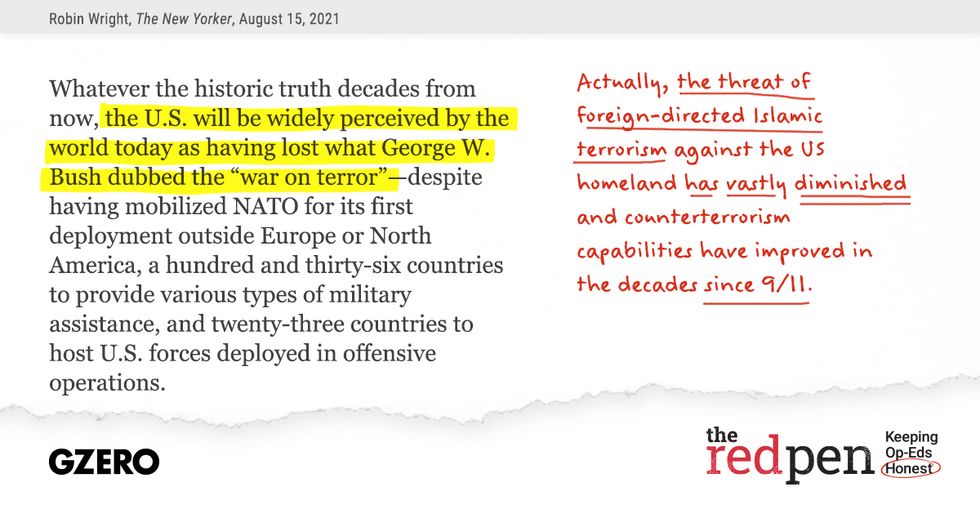
Wright calls the withdrawal an epic defeat for US forces at the hands of a ragtag militia with no air power or significant armor or artillery in one of the poorest countries in the world. I want to be clear, the Taliban didn't militarily defeat US forces. US forces haven't been fighting for quite some time there. That's why they weren't US casualties. The United States forces left. Like so many other commentaries that have attended the Taliban's resurgence to power, Robin's piece suggests that the United States lost without specifying what it would mean for Washington to have won. America's choices this year weren't defeat and victory, but a range of bad alternatives that would have each involved very, very painful trade-offs. Biden's options ranged from bad to really horrible, not from acceptable to superb, and Robin acknowledged that in a column she wrote on March 24th, writing that, "Biden has no good choices. Neither does the US military, which has reduced troop levels from 15,000 when the US-Taliban pact was signed a year ago, to around 3,000 today."
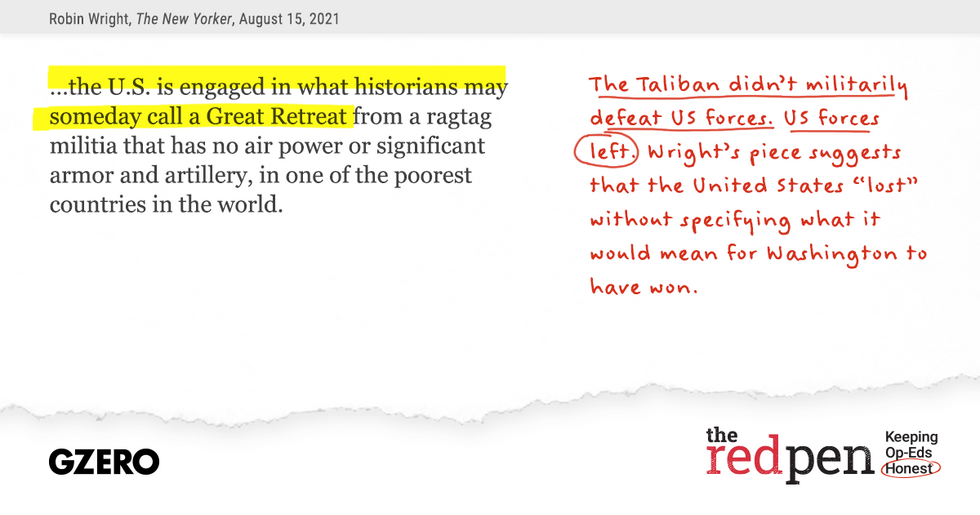
Three, next, Wright laminates that, "Afghanistan and Iraq have proved that the United States can neither build nations nor create armies out of scratch," warning that the repercussions of this failure will long endure. Oh, I agree with that, but I would argue that that's a good thing. The realization is that Washington needs to reevaluate its democracy promotion model, and focus on advancing aims of open societies by means other than military force. In other words, working within the confines of reality in other countries, rather than trying to mold the world in America's own image. I mean, beyond enhancing US influence abroad, I also think that kind of a shift would free up a lot of sums of money that we could be spending on the United States, think trillions of dollars of infrastructure, for example.
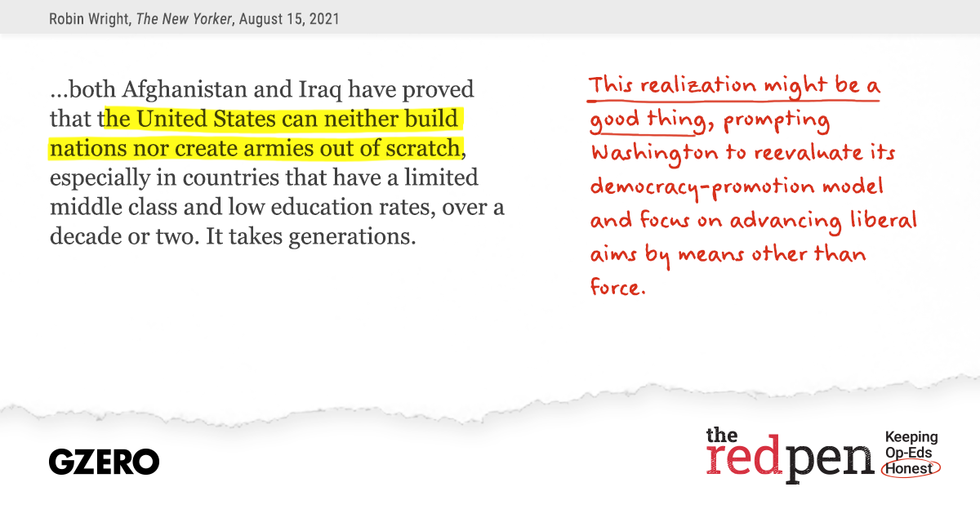
Wright also argues that America's post-withdrawal standing is "profoundly weakened," and questions "how the United States salvages its reputation or position any time soon." And I am sympathetic to this point, but I think it's overdone. Despite some fiery statements from European officials, leaders from London, to Tokyo, to New Delhi and beyond remain pro-US. Washington's very much blown exit from Afghanistan doesn't mean we won't be able to form a coalition if say, China invades Taiwan. In fact, for all the world's criticism over the last 18 months and the last five years, really, if one begins with Trump's election, which was not popular with American allies, clearly, actual US power vis-à-vis the allies, has increased since the start of the pandemic. America's financial system has only become more important, America's technological prowess has only improved. The US is far stronger now than its G7 allies. And don't get me started on China, which continues to self-inflict wounds by stonewalling on COVID-19 origins, producing poorly performing vaccines, and inflaming tensions with almost everybody; India, Australia, Canada, Europe. So much so with Europe that Brussels has frozen ratification of its own investment accord with Beijing. So, I mean, if the United States has made big mistakes with Afghanistan, I'd argue that China's mistakes over the last year have been even greater. And don't get me started on the demographic challenges. So if you had to pick a country that you wanted to be in today's messy, GZERO world, from a power position, it's clearly the United States, and Afghanistan doesn't change that.
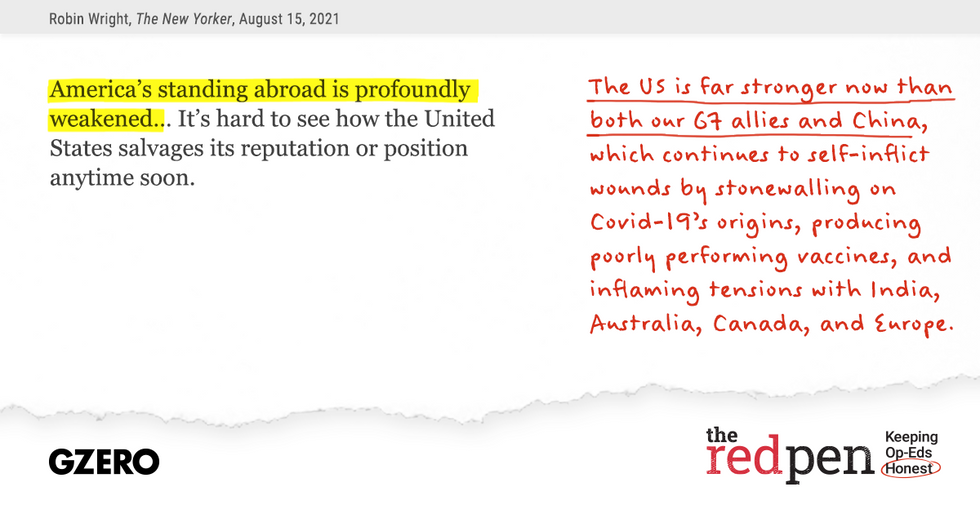
Finally, Robin concludes by writing, "On Sunday as America erased its presence in Afghanistan in a race to get out, I wondered: Was it all for naught? What other consequences will America face from its failed campaign in Afghanistan decades from now? We barely know the answers." Very good question. The Taliban's return to power will be devastating for human rights in Afghanistan, especially for women, children, LGBT people, and ethnic and religious minorities. There's no avoiding that very tragic conclusion. The strategic consequences of US withdrawal are likely to be much more limited, in my view. In fact, President Biden's disdain for open-ended wars suggests that Washington will avoid stumbling into another one soon; I would argue that's a good thing. And drawing down from Afghanistan will also enable the US to focus on the biggest foreign policy challenge. Wright's worst-case scenario, the collapse of US power remains, for now at least, really just the scenario.
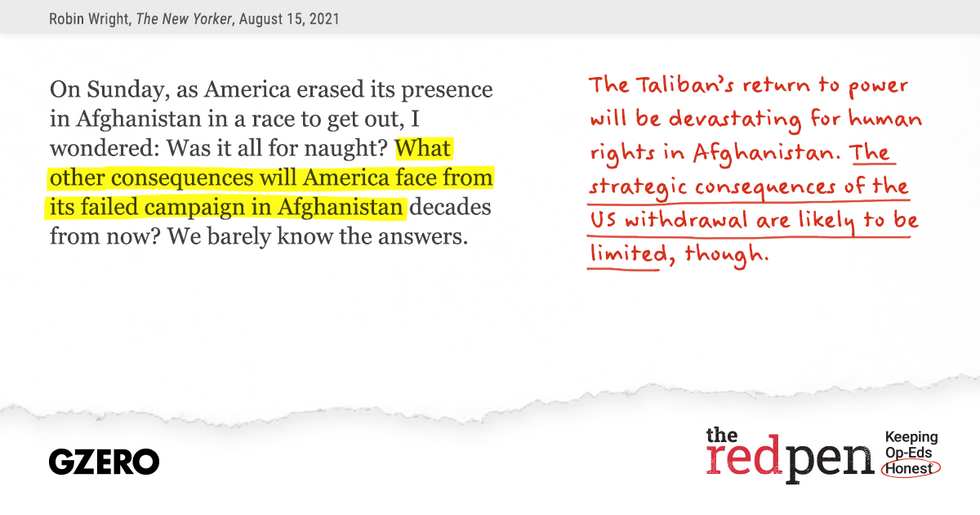
So that's your Red Pen for this week, stick with GZERO Media for more analysis of the unfolding situation in Afghanistan, and the upcoming anniversary of the 9/11 terror attack. See you again very soon.
Keep reading...Show less
More from The Red Pen
Fix climate change, don't just adapt to its consequences
November 05, 2021
Biden's mistakes in Afghanistan were not "dereliction of duty"
September 02, 2021
Would China really invade Taiwan?
May 06, 2021
Mitt Romney isn't the future of the GOP. He's the past.
February 12, 2021
Israel-UAE relations & the Abraham Accords are not at risk under Biden
February 05, 2021
China's EU deal betrays insecurity; not a wedge between US & EU
January 07, 2021
America is still a democracy post-Trump, but is it a healthy one?
December 11, 2020
Don’t "give up" on all 73 million Americans who voted for Trump
November 20, 2020
The GOP siding with Trump is hardly a threat to democracy
November 12, 2020
"Fixing" US foreign policy isn't the real challenge Biden would face
October 16, 2020
Calling AMLO authoritarian is a gross exaggeration
October 08, 2020
The US COVID response under Trump was not "merely mediocre"
September 09, 2020
US-Russia: An all-or-nothing approach leaves US with nothing
August 14, 2020
The recovery will be a jagged swoosh, not a V-shape
July 10, 2020
Criticisms of US COVID response vs EU are not partisan
July 01, 2020
Hong Kong is a tragedy, not a domino
June 03, 2020
No, don’t abolish the WTO. Reform it.
May 07, 2020
Ian Bremmer: The United States isn't Sweden
April 30, 2020
GZERO Series
GZERO Daily: our free newsletter about global politics
Keep up with what’s going on around the world - and why it matters.

